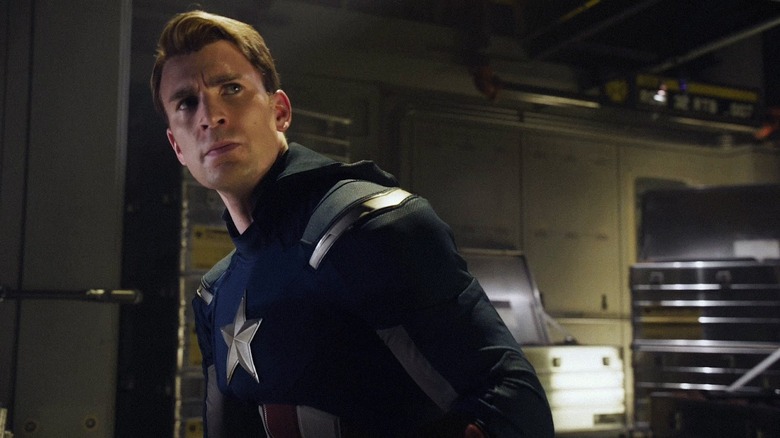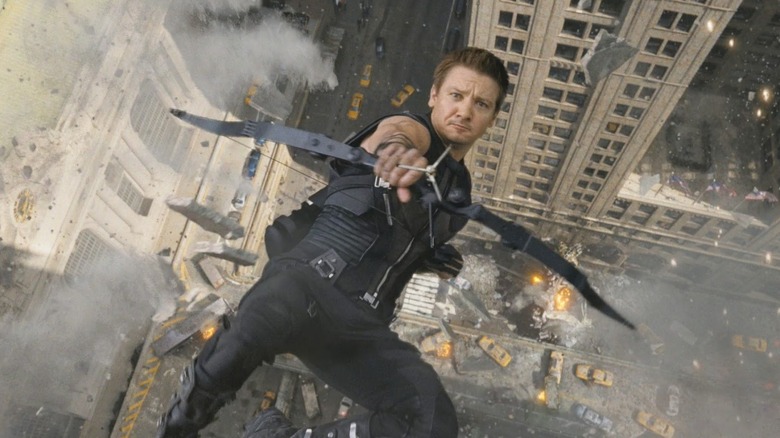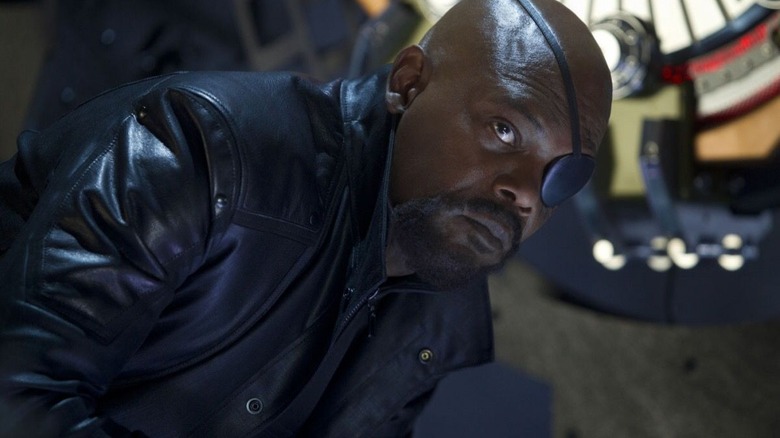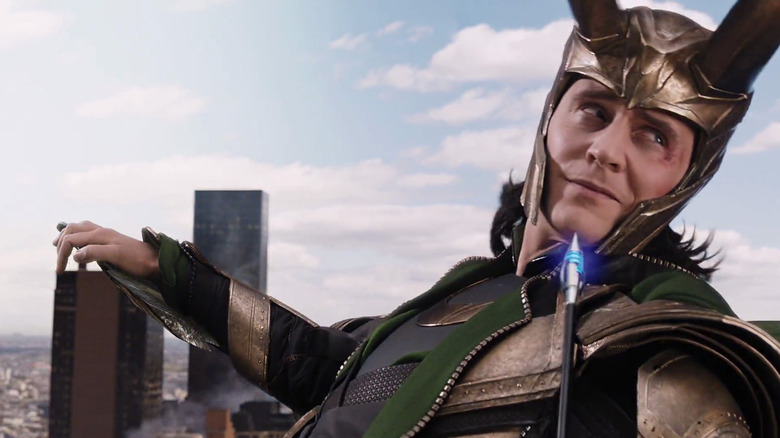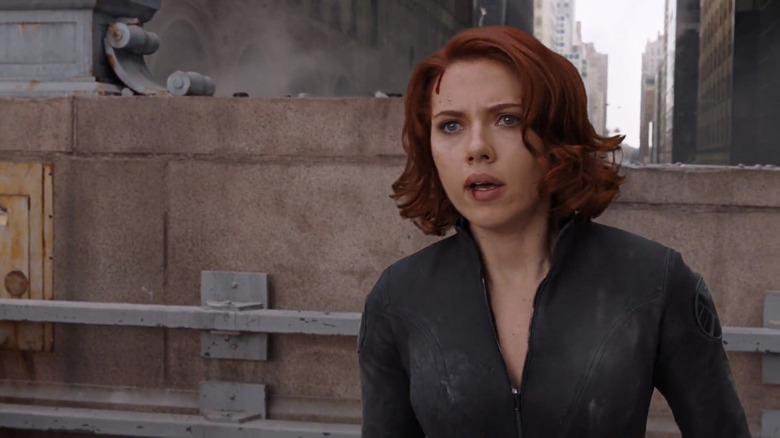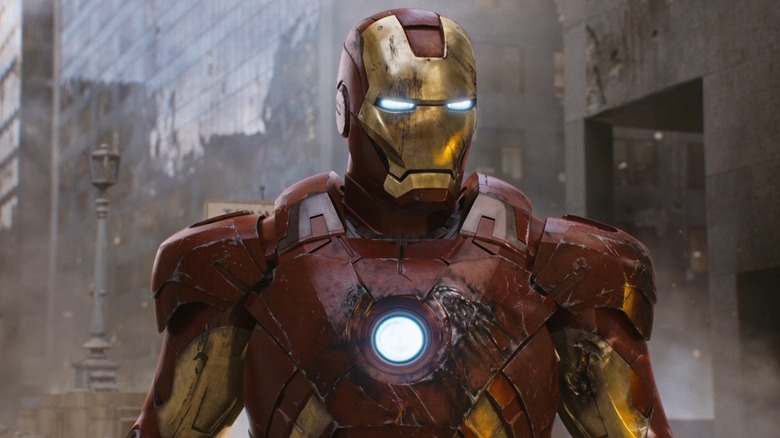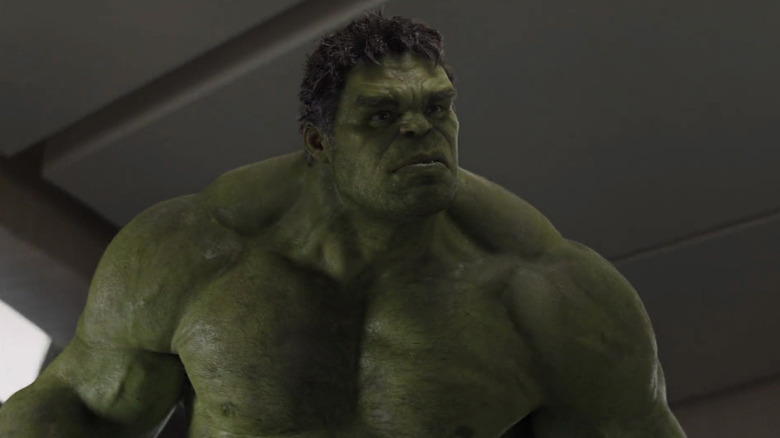Here's What The Worst Critic Reviews Said About Marvel's The Avengers
At this late date, one might be curious to know what the general public thinks of Joss Whedon's 2012 blockbuster "Marvel's The Avengers." When it was released, it was an event unlike anything that came before. Thanks to a novel release schedule by Marvel Studios, several solo superhero flicks preceded "The Avengers," setting up each of the individual characters as autonomous entities before their inevitable team-up. When the team-up finally struck, audiences went mad, granting "The Avengers" a $207 million opening weekend, and a cumulative worldwide gross of $1.5 billion. The success of the Marvel Cinematic Universe altered film journalism for a decade, keeping enthusiasm for the series at a constant high boil. Many assumed that the superhero genre was peerless, untouchable, and eternal.
Today, the MCU has faltered, interest has fallen, and superheroes are limping out the door. What's more, Joss Whedon has been repeatedly ousted as abusive and inappropriate, effectively shedding the passionate cult that once surrounded him. Given that we are no longer locked into a cycle of bottomless anticipation, will audiences still react as enthusiastically to "The Avengers," or will they simply remark on it as a relic of the 2010s?
When "The Avengers" first came out, not all reviews were kind. Most of them were — the film has 91% approval rating on Rotten Tomatoes — but 33 RT-approved critics gave the film an effective "thumbs down," standing contrary to popular opinion. Indeed, critics writing for such outlets as the New York Times, and the Wall Street Journal were dispassionate or sour toward Whedon's ultra-team-up film.
Here's was some of the more critical reviews, vintage 2012, had to say about "The Avengers."
I gave The Avengers a 6/10
In the interest of full disclosure, I include myself. My own review is listed as one of the negative reviews listed on Rotten Tomatoes. In 2012, I was writing for a now-defunct website called CraveOnline, and my review accrued a great deal of hatred from the world's many "Avengers" fans merely because I gave it a 6 out of 10.
I felt — and still feel — that "The Avengers" is essentially the Platonic ideal of a Saturday morning cartoon ... carrying with it all of the positives and negatives in that statement. It terms of little-kid-style thrills, "The Avengers" is first-rate. It's slickly made and features a wide panoply of superhero action. Each character gets to interact, fight, and display their superpowers in equal measure, and the glory shots of all the costumed vigilantes gearing up for an alien invasion is everything an 8-year-old might want.
But after using several years and multiple films to set up a team-up movie, it was massively disappointing that the superheroes didn't do anything more than, well, mere superhero stuff. One would assume that a project of this size, requiring the money and logistics that it did, would have something novel to say about superherodom. That it would deconstruct heroism, kill a character, comment on the morals of vigilantism, or do something — anything! — that couldn't be found on a comic book page. It merely repeated another medium. It felt like a cover song.
Ultimately, "The Avengers" was a movie about very little, leaving its ambitions feel slight and paltry. It was about ... teamwork, I guess. The kind of thing we learned in the first grade. It's thrilling on a visceral level, but it would have been nice if the filmmakers had something to say.
A.O. Scott
The most notorious review of "The Avengers" probably came from A.O. Scott of the New York Times. Scott gave the film 2 stars out of 5, feeling the entire project to be artificial and cynical. He wrote:
"While 'The Avengers' is hardly worth raging about, its failures are significant and dispiriting. The light, amusing bits cannot overcome the grinding, hectic emptiness, the bloated cynicism that is less a shortcoming of this particular film than a feature of the genre."
Scott continued, pointing out that the superhero genre, even as early as 2012, had recognizable limits in terms of storytelling, writing:
"It is not as if the number of movies featuring troubled guys wearing costumes and fighting evil has diminished since then. Quite the contrary. But, the genre, though it is still in a period of commercial ascendancy, has also entered a phase of imaginative decadence."
Scott seems to have been an early adopter of popular criticisms of the MCU in general. When each film is part of a larger, interlocking super narrative, each individual chapter can feel like an incomplete, empty gear ... or worse, a mere commercial for an upcoming movie. This review was openly reviled on social media, and "Avengers" star Samuel L. Jackson even sicced "Avengers" fans on Scott, Tweeting "#Avengers fans, NY Times critic A.O. Scott needs a new job! Let's help him find one! One he can ACTUALLY do!"
In response, Scott wrote an entire book defending the art of film criticism, a vital tome in the face of a series of ostensibly "critic-proof" films like the ones in the MCU. Scott's "Better Living Through Criticism," might be the most insightful thing to come out of the toxic fandom that arose in the primordial soup of Marvel fandom.
Joe Morgenstern
Joe Morgenstern of the Wall Street Journal wasn't able to see beyond the clanging action of "The Avengers." It's a persistent truth about cinema that action tends to be the least interesting part of a movie, as action sequences are little more than little intermissions in between character moments and story developments. As such, when "The Avengers" climaxed with a city-wide invasion of faceless space aliens, and the Avengers began rocketing about stabbing and shooting them, Morgenstern could only sit in patient silence waiting for it to end. Morgenstern also didn't like the slow opening scenes, writing:
"A slow start, a single star performance surrounded by indifferent acting and an onslaught of computer effects that range from seen-it-all-in-'Transformers' to a whole sky full of spectacular stuff in the midtown Manhattan climax."
Familiarity breeds contempt, as the old aphorism goes.
Morgenstern has famously adopted the (rather correct) criticism philosophy that an enjoyable film isn't necessarily the same as a good one. Something that is entertaining and gratifying to one's primal brain isn't the same thing as a well-structured and ambitious work of art. At best "The Avengers" is the former. It lights the hearts of young kids who want to see Man in Blue Suit punch Green Man and Rocket Robot Guy, but has no ambitions beyond that.
He, at the very least, praised Robert Downey, Jr. for giving a wonderful performance.
Karina Longworth
Karina Longworth, writing for the Village Voice, wasn't about to take any B.S. from the Avengers. She saw Whedon's film as little more than boyish, immature masculine posturing, a monument to the fragility of the male ego. She noted that the four main Avengers "form a varied gallery of masculine neuroses." The women, meanwhile, are given even less. Longworth also had little patience for the shallow characterization, writing:
"They're ... largely up their own [butts], each of them lone warriors wary of giving up control. [...] Whedon uses the calm in between Loki-initiated storms to demonstrate ad nauseam that the Avengers just can't get along. As daring as it might seem for the biggest superhero movie ever to turn the action knob way down for an hour so that its actors can do some acting, the actual material they're given is as programmatic as a bad culture-clash rom-com, transparently meant to tear our heroes apart just so they can come back together."
Because the story is not ambitious, it falls back into predictability. "Really, who cares about another battle?" Longworth wrote, "We all know how this is going to end." Many fans responded positively to the film's brisk brightness and stakes-free tone; fighting evil is easy and non-lethal for the Avengers. Longworth rightly pointed out that there was little thrill when the entire multi-million-dollar film felt so insubstantial.
Stephanie Zacharek
Writing for Movieline, Stephanie Zacharek was blunt, calling Whedon's film "a G-8 summit of action figures." She continued, "It's less a movie than a novelization of itself, an oversized, self-aware picture designed mostly for effect: That of reliving the experience of a movie you've seen before and just can't get enough of." Zacharek noted that Joss Whedon had a creative advantage in making "The Avengers" in that he didn't have to establish anything, as the characters were all introduced in other films, and he didn't need to build up any goodwill, as fans walked into the movie already loving the characters. As such, all Whedon had to do was conceive of a few action set pieces lightly connected by comedic dialogue. Boom. Super blockbuster.
Zacharek wrote:
"[T]he movie's scale and size does little to serve those characters, and there's something self-congratulatory about Whedon's whole approach, as if he were making a movie only for people who are already in on the in-joke. Comic-book aficionados who have always loved the Avengers may very well love 'The Avengers'; those who wouldn't know a Tesseract from a Rubik's Cube may feel differently. That's the thing about other people's nostalgia: It's always a b*tch."
As with the above reviews, Zacharek seems to be zeroing in on what many would begin saying about MCU movies in another decade or so. Once their reliance on audience goodwill began to wear thin, audiences could finally see MCU movies as thudding and thin, unable to stand on their own.
Amy Nicholson
Amy Nicholson, writing for Box Office Magazine, had the distinction of publishing the first "rotten" rating on "The Avengers" Rotten Tomatoes page. Nicholson noted that the characters in "The Avengers" were too thin, which is fair. Audiences have to take for granted the fact that these superheroes are on the side of righteousness and that they want to serve as a freelance military force; there are no conversations about the nature of being a hero, nor are there solutions discussed that don't involve a head-on, violent assault.
The trippingly tone, for Nicholson, was an issue. She wrote:
"'The Avengers' almost works. It's funny and it's physical, but even at two and a half hours, it plays like it's on fast-forward. Forget character development — there's not even character explanation. The lesser Avengers are most slighted. After two movies with Black Widow and Hawkeye, I know less about them than I do the fighting Panda in 'Tekken.' If such a thing can be said about a $220m dollar blockbuster, 'The Avengers' needs more ambition."
She continued: "Sure, it's fine for most films to host their battle royale in downtown Manhattan, but the superfriends deserve more. Prehistoric metal monsters smashing up skyscrapers? We've seen that before."
All told, the critics — including myself — seem to be unified. The movie is action-packed but unsophisticated and unengaging. There are too many assumptions about what the audience already loves, and how their tolerance for "The Avengers" is going to be directly proportional to that.
What do you think? Do these reviews line up with the modern gauge?
